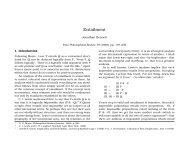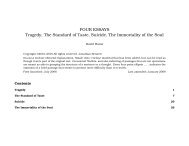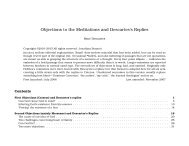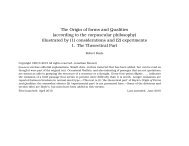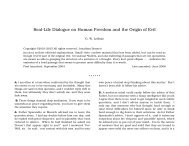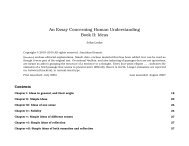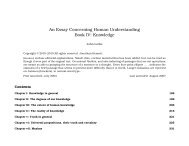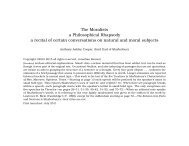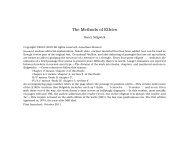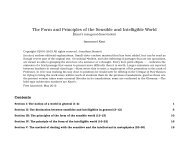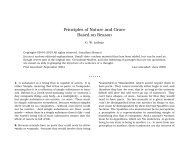A Vindication of the Rights of Woman with - Early Modern Texts
A Vindication of the Rights of Woman with - Early Modern Texts
A Vindication of the Rights of Woman with - Early Modern Texts
Create successful ePaper yourself
Turn your PDF publications into a flip-book with our unique Google optimized e-Paper software.
The <strong>Rights</strong> <strong>of</strong> <strong>Woman</strong> Mary Wollstonecraft 5: Pity bordering on contempt<br />
not to pretend to anything that she doesn’t understand in<br />
some degree, she has no need to hide her talents; let things<br />
take <strong>the</strong>ir natural course, and all will be well.<br />
It is this system <strong>of</strong> pretence all through Dr Gregory’s book<br />
that I despise. Women are always to seem to be this and<br />
that; but virtue might speak in Hamlet’s words: ‘Seems! I<br />
know not seems!—Have that <strong>with</strong>in that passeth show!’<br />
In ano<strong>the</strong>r place, after indiscriminately recommending<br />
delicacy, he adds:<br />
The men will complain <strong>of</strong> your reserve. They will<br />
assure you that a franker behaviour would make<br />
you more lovable. But, trust me, <strong>the</strong>y aren’t sincere<br />
when <strong>the</strong>y tell you that. I acknowledge that on some<br />
occasions it [= a more open and forthright manner] might<br />
make you more agreeable as companions, but it would<br />
make you less lovable as women. And that is an<br />
important distinction, which many <strong>of</strong> your sex are not<br />
aware <strong>of</strong>.<br />
This desire <strong>of</strong> always being women is <strong>the</strong> very frame <strong>of</strong><br />
mind that degrades <strong>the</strong> ·female· sex. Except <strong>with</strong> a lover,<br />
it would (I repeat) be well if <strong>the</strong>y were only agreeable or<br />
rational companions. But in this respect Gregory’s advice is<br />
inconsistent <strong>with</strong> something else he says, which I now quote<br />
<strong>with</strong> strong approval:<br />
The view that a woman may allow all innocent freedoms<br />
provided her virtue is secure is both grossly<br />
indelicate and dangerous, and has proved fatal to<br />
many <strong>of</strong> your sex.<br />
I agree <strong>with</strong> this. A man or woman <strong>of</strong> any feeling must<br />
always wish to convince a beloved object that what he or she<br />
is getting and returning <strong>with</strong> pleasure are caresses <strong>of</strong> <strong>the</strong><br />
individual, not <strong>of</strong> <strong>the</strong> sex; and that <strong>the</strong> heart is moved ra<strong>the</strong>r<br />
than <strong>the</strong> senses. Without this natural delicacy, love becomes<br />
a selfish personal gratification that degrades <strong>the</strong> character.<br />
64<br />
I take this view fur<strong>the</strong>r. When love is out <strong>of</strong> <strong>the</strong> question,<br />
affection authorises many personal endearments that<br />
flow naturally from an innocent heart and give life to <strong>the</strong><br />
behaviour; but <strong>the</strong> personal interplay <strong>of</strong> appetite, gallantry,<br />
or vanity, is despicable. Suppose a man is helping a pretty<br />
woman into a carriage—a woman he doesn’t know—and he<br />
squeezes her hand: if she has any true delicacy she will<br />
regard this impertinent freedom as something like an insult,<br />
ra<strong>the</strong>r than being flattered by this meaningless homage to<br />
beauty. . . .<br />
Wanting to feed <strong>the</strong> affections <strong>with</strong> what is now <strong>the</strong> food<br />
<strong>of</strong> vanity, I would like to persuade my sex to act from simpler<br />
principles. Let <strong>the</strong>m merit love, and <strong>the</strong>y will obtain it,<br />
though <strong>the</strong>y may never be told that. ·I like Dr Gregory’s<br />
remark·: ‘The power <strong>of</strong> a fine woman over <strong>the</strong> hearts <strong>of</strong> very<br />
able men is beyond what she conceives.’<br />
I have already remarked on <strong>the</strong> narrow cautions Gregory<br />
<strong>of</strong>fers relating to deceit, female s<strong>of</strong>tness, delicacy <strong>of</strong> constitution;<br />
for <strong>the</strong>se are <strong>the</strong> <strong>the</strong>mes that he keeps endlessly coming<br />
back to. He handles <strong>the</strong>m in a more decorous manner than<br />
Rousseau does; but basically he agrees <strong>with</strong> Rousseau on<br />
<strong>the</strong>se matters, and if you take <strong>the</strong> trouble to analyse <strong>the</strong>se<br />
opinions ·<strong>of</strong> Gregory’s· you’ll find that <strong>the</strong> first principles are<br />
not quite so delicate as <strong>the</strong> superstructure!<br />
You’ll see in due course that my views about friendship,<br />
love, and marriage are non-trivially different from Gregory’s.<br />
I don’t want to get ahead <strong>of</strong> myself and talk about that<br />
now, important as it is. I want here merely to remark on<br />
<strong>the</strong> over-all spirit <strong>of</strong> Gregory’s treatment <strong>of</strong> <strong>the</strong>m, on his<br />
cautious family prudence, on his limited views <strong>of</strong> partial<br />
unenlightened affection. These views exclude pleasure and<br />
improvement by vainly wanting to fend <strong>of</strong>f sorrow and error—<br />
and by thus guarding <strong>the</strong> heart and mind, destroy all <strong>the</strong>ir<br />
energy. It is far better to be <strong>of</strong>ten deceived than never to



